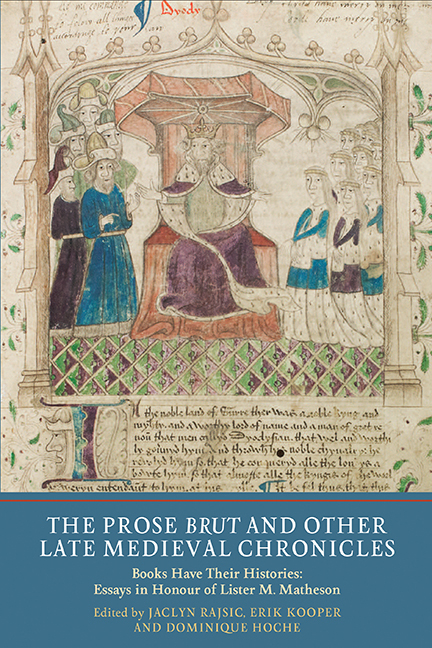 The Prose Brut and Other Late Medieval Chronicles
The Prose Brut and Other Late Medieval Chronicles Book contents
- Frontmatter
- Dedication
- Contents
- List of Plates
- List of Contributors
- Acknowledgements
- Curriculum Vitae of Lister M. Matheson
- Introduction
- A Memoir: The Whole Haggis: Lessons From the Work of Lister M. Matheson
- Part I Uses of History
- Part II The Prose Brut
- Part III Receptions and Afterlives of Late Medieval Chronicles
- 9 Trevet's Les Cronicles: Manuscripts, Owners and Readers
- 10 Matthew Parker and the Middle English Prose Brut
- 11 Thomas Hearne and English Chronicles
- 12 The Manuscript of Castleford's Chronicle: Its History and its Scribes
- 13 Bruts for Sale
- Index of Manuscripts Cited
- General Index
- Tabula in Memoriam
11 - Thomas Hearne and English Chronicles
from Part III - Receptions and Afterlives of Late Medieval Chronicles
Published online by Cambridge University Press: 05 July 2016
- Frontmatter
- Dedication
- Contents
- List of Plates
- List of Contributors
- Acknowledgements
- Curriculum Vitae of Lister M. Matheson
- Introduction
- A Memoir: The Whole Haggis: Lessons From the Work of Lister M. Matheson
- Part I Uses of History
- Part II The Prose Brut
- Part III Receptions and Afterlives of Late Medieval Chronicles
- 9 Trevet's Les Cronicles: Manuscripts, Owners and Readers
- 10 Matthew Parker and the Middle English Prose Brut
- 11 Thomas Hearne and English Chronicles
- 12 The Manuscript of Castleford's Chronicle: Its History and its Scribes
- 13 Bruts for Sale
- Index of Manuscripts Cited
- General Index
- Tabula in Memoriam
Summary
THE early eighteenth century antiquarian Thomas Hearne (1678–1735) devoted much of his life to publishing medieval chronicles of England written in Latin and in English. Although his efforts, Joan H. Pittock observes, were condemned by contemporaries as work that was ‘self-evidently lacking in utility, refinement, and especially in application’, they contributed to the ‘preservation of a past no longer fashionable’ and demonstrated ‘root characteristics of Englishness which otherwise would not have survived’. Although many in England expressed disdain for the study of the Middle Ages, many others appreciated his efforts to inform readers about England's medieval past, and his books sold well. In the paragraphs below, after discussing Hearne and his publications, I shall turn to his interest in four chronicles written in English that I became acquainted with over thirty years ago when working on A Manual of the Writings in Middle English: the early fourteenth century metrical chronicles of Robert of Gloucester and Robert Mannyng and the sixteenth-century prose chronicle generally known as ‘Hearne's Fragment’, all of which Hearne edited; and a chronicle that he had planned to edit, the late fourteenth/fifteenth century English Prose Brut. As will be apparent from the paragraphs that follow, Hearne's comments about these works in his introductions, diaries and notebooks indicate that he, unlike many of his contemporaries and later scholars, realized their importance, and the importance of other chronicles, to English historical and literary studies. He also anticipated some modern theories about editing and about the value of the study of individual manuscripts.
Hearne was trained as a classicist at Oxford. He entered St Edmund Hall in 1696, received his BA in 1699 and his MA in 1703, and lived there for the rest of his life. He began his scholarly career with the publication between 1703 and 1708 of four editions of highly regarded classical authors, or ‘Ancients’ as they were then known. From 1709 on, however, most of his efforts, except for an edition of the Acta apostolorum (1715), went into publishing the first editions of many medieval and early modern writers.
- Type
- Chapter
- Information
- The Prose Brut and Other Late Medieval ChroniclesBooks have their Histories. Essays in Honour of Lister M. Matheson, pp. 181 - 198Publisher: Boydell & BrewerPrint publication year: 2016
